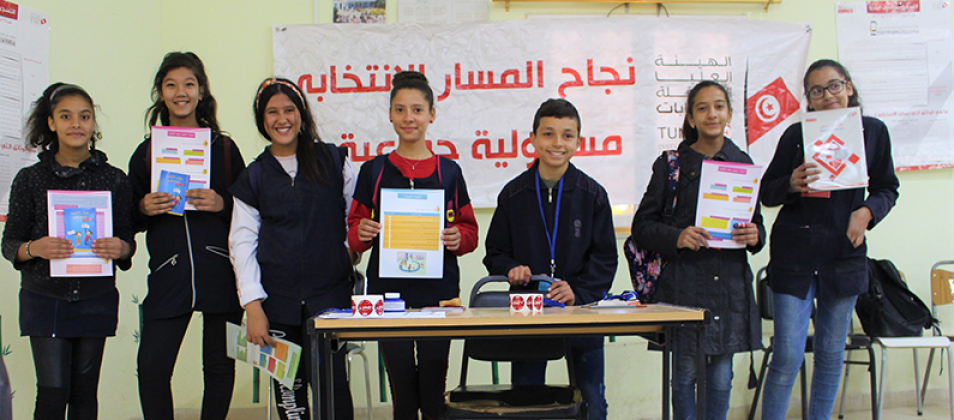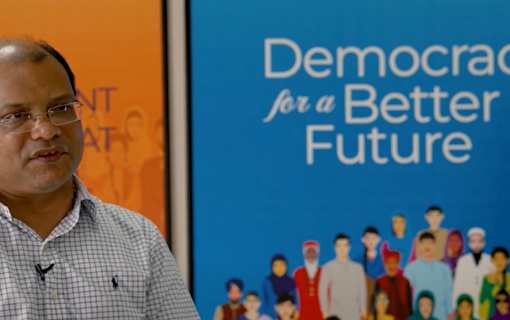
Photo Gallery: Awakening the Next Generation of Tunisian Voters
To address a lack of civic education in schools and create an informed and civic-minded future generation, the International Foundation for Electoral Systems (IFES), in cooperation with the Tunisian High Independent Authority for Elections (ISIE) and Ministry of Education (MoE), developed the Democratic Awakening Toolkit, which presents basic information about democracy and elections tailored for both primary and secondary school students. The toolkit, designed to be integrated into schools’ civic education curriculum, is comprised of a teaching manual, pedagogical resources and reusable materials to simulate voting in classrooms, such as ballots, a ballot box, voting booths, accreditation cards, and poll worker and observer badges.
The MoE, supported by the ISIE, launched the first pilot program of the Democratic Awakening Toolkit in September 2018. To support the pilot, IFES produced 1,500 toolkits – 900 for primary schools and 600 for secondary schools – which were distributed to participating schools across Tunisia. During the pilot, approximately 100,000 students, ages 10 to 15, received electoral and civic education through the Democratic Awakening Toolkit. Additionally, the MoE used the toolkit to organize elections for two new initiatives – the Youth Parliament and the youth municipal council in Sfax – and elections for citizenship clubs in schools. The toolkit deeply engaged the students and produced positive behavioral and attitudinal changes.
Teachers and parents alike noticed that, as a result of the toolkit, students felt more responsible for and engaged in learning about the rights and duties of citizens. One secondary school student said, “I believe that voting is a national duty that we should not remember it only when we reach 18 years old. It is a process that starts with civic education from the primary and secondary school so that when we reach the voting age we have the full knowledge to make decisions.” In teachers’ view, the interactive nature of the toolkit, which involves student debates, speeches and voting simulations, increased their students’ interest and involvement in the civic education course. An IFES survey of teachers who used the toolkit found that 88 percent of respondents reported that the toolkit encouraged students’ civic engagement and 100 percent confirmed that the toolkit increased students’ interest in civic education. Teachers underlined that the toolkit transformed the topic of civic education into an exciting subject for students, who had attached little importance to it before. For this reason, a teacher from Bizerte observed that the toolkit resulted in “a more concrete anchoring of student citizenship and democratic values.”
IFES interviews found that the toolkit also unexpectedly led to increased knowledge of elections and enhanced civic engagement among teachers and parents. Teachers felt that teaching with the Democratic Awakening Toolkit, which provides updated civic education information compared to the textbooks normally used by teachers, helped them to better understand election-related concepts and procedures. One teacher from Beja stated, “the Democracy Awakening Toolkit helped clarify and simplify concepts not only to students but to teachers as well.” Furthermore, teachers felt that the toolkit encouraged them to improve their teaching methodology since the toolkit makes civic education more interactive, innovative and technology-oriented. Parents also benefited from the positive impact of the toolkit. One student who attended the IFES-organized evaluation workshop in March 2019 mentioned, “My parents never voted before, but after I participated in the election simulation, I encouraged them to participate and my parents are waiting for the forthcoming elections to vote.”
MoE representatives summarized well the success and impact of the pilot of the Democratic Awakening Toolkit: “the impact of the project has been higher than initially anticipated. It surpassed our expectations to such a point that we were surprised ourselves.” They observed that “the toolkit contributed critically to the behavioral change of pupils but also of teachers through its interactive and practical approach,” adding, “the toolkit has become a need and not only a civic education tool. It contributes to the anchoring of democratic values.” As a result of the toolkit’s success, the MoE has requested that it be expanded to all 7,500 primary, secondary and high schools across Tunisia.
Through the pilot program, the Democratic Awakening Toolkit has proven itself an effective tool for increasing students’ engagement in civic education and commitment to civic participation. Given the low rates of youth participation in the May 2018 municipal elections, enhancing civic education for students is vital to consolidating Tunisia’s democratic system and culture.
A photo gallery of the pilot program can be found here or by clicking on the image below.
Primary school students in Ariana learn about the components of a polling station during a civic education session.
This project was co-funded by the United States Department of State’s Middle East Partnership Initiative and the Swiss Development and Cooperation Agency.













